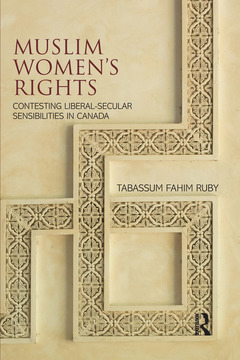Description
Muslim Women's Rights
Contesting Liberal-Secular Sensibilities in Canada
Global Gender Series
Author: Ruby Tabassum Fahim
Language: English
Subjects for Muslim Women's Rights:
Keywords
Roman Catholic Religious Education; MNA; Muslim; Women’s Equality Rights; Women; Canadian Muslim Community; liberal; Resolve Family Disputes; secular; Muslim Women’s Rights; rights; Mehdi Golshani; Ontario; Ontario Arbitration Act; shari’ah; Canadian Muslim; tribunal; Boyd Report; Islam; Canadian Muslim Women; Religion; Tribunal Debates; Politics; Muslim World; Canada; Family Arbitration; equality; Muslim Women; Justice; Tawhidi Worldview; legal; Muslim Family Law; discourse; Arbitration Act; postcolonial; Religious Arbitration; racism; Oppressed Muslim Woman; feminist; CEDAW; transnational; Multicultural Discourse; west; Human Rights; moral; Religious Divorce; gender
Publication date: 12-2020
· 15.6x23.4 cm · Paperback
Publication date: 03-2019
· 15.6x23.4 cm · Hardback
Description
/li>Contents
/li>Readership
/li>Biography
/li>
In the post-9/11 environment, the figure of the Muslim woman is at the forefront of global politics. Her representation is often articulated within a rights discourse owing much to liberal-secular sensibilities?notions of freedom, equality, rational thinking, individualism, and modernization. Muslim Women?s Rights explores how these liberal-secular sensibilities inform, shape, and foreclose public discussion on questions of Islam and gender.
The book draws on postcolonial, antiracist, and transnational feminist studies in order to analyze public and legal debates surrounding proposed shari?ah tribunals in Canada. It examines the cultural and epistemological suppositions underlying common assumptions about Islamic laws; explores how these assumptions are informed by the Western progress narrative and women?s rights debates; and asks what forms of politics these enable and foreclose. The book assesses the influence of secularism on the ontology, epistemology, and ethics afforded to Islam in the West, and begins to trace possibilities by which Islamic family law might be productively addressed on its own terms.
Muslim Women?s Rights is a significant contribution to the fields of both Islam and gender and the critical study of secularism.
Preface, Acknowledgments, Glossary of Arabic Words, 1. Liberal-Secular Sensibilities and a Genealogy of the Ontario Shari‘ah Tribunals 2. From Orientalism to Neo-Orientalism: Discourses of Race and Imperial Hegemony in the Name of Gender Equality 3. Liberalism, the Court System, and Multiculturalism: Examining Epistemic Claims 4. Secularism and Its Discontents: Social Hierarchies that Matter 5. Aversion or Conversion: A Missed Opportunity? 6. Ideology, Ontology, and Epistemology: Shari‘ah Debates and the Tawhidi (Unitary) Weltanschauung 7. Conclusion: Signs are Enough for Those Who Think
Tabassum Fahim Ruby is an assistant professor at West Chester University of Pennsylvania, USA. Her research focuses on Islam and gender discourses, liberal-secular epistemology, and globalization. Her most recent publications have appeared in Frontiers: A Journal of Women Studies, Women’s Studies International Forum,and Feminist Formations.



